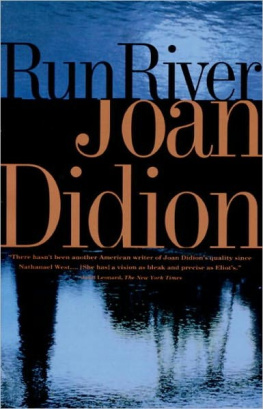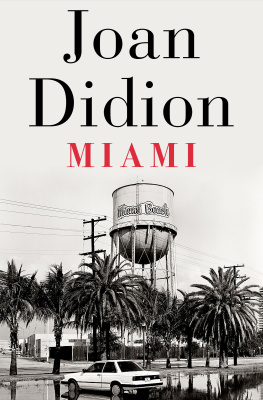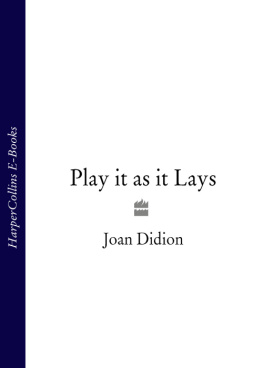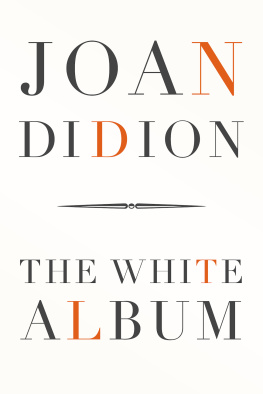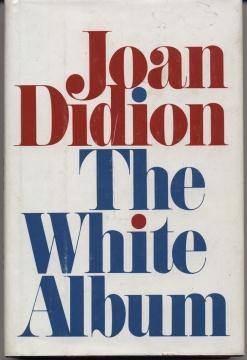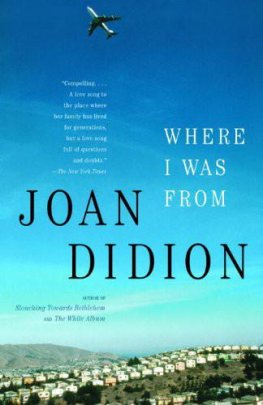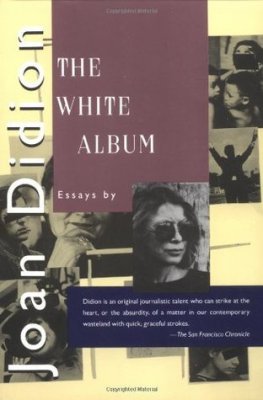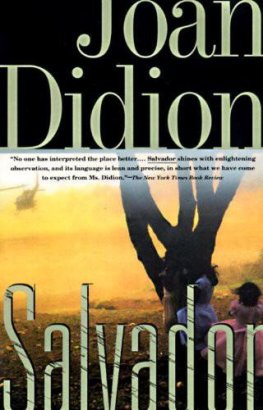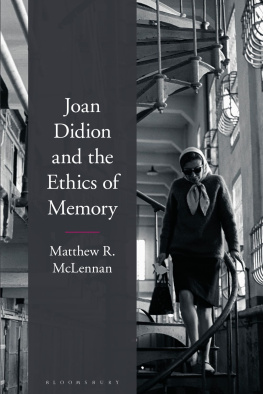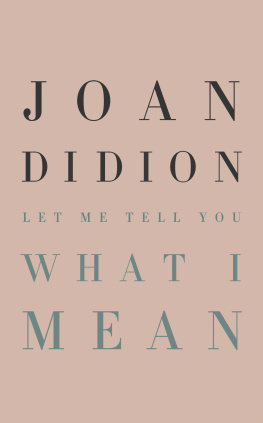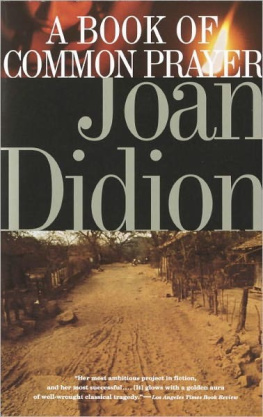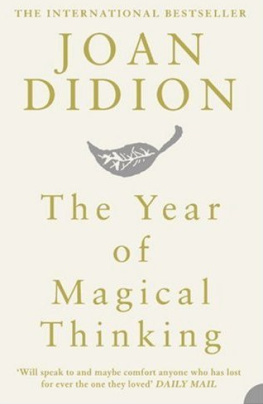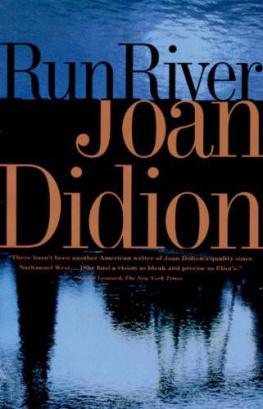Didion - Run River
Here you can read online Didion - Run River full text of the book (entire story) in english for free. Download pdf and epub, get meaning, cover and reviews about this ebook. year: 1963;2011, publisher: Vintage;Knopf Doubleday Publishing Group, genre: Prose. Description of the work, (preface) as well as reviews are available. Best literature library LitArk.com created for fans of good reading and offers a wide selection of genres:
Romance novel
Science fiction
Adventure
Detective
Science
History
Home and family
Prose
Art
Politics
Computer
Non-fiction
Religion
Business
Children
Humor
Choose a favorite category and find really read worthwhile books. Enjoy immersion in the world of imagination, feel the emotions of the characters or learn something new for yourself, make an fascinating discovery.
Run River: summary, description and annotation
We offer to read an annotation, description, summary or preface (depends on what the author of the book "Run River" wrote himself). If you haven't found the necessary information about the book — write in the comments, we will try to find it.
Run River — read online for free the complete book (whole text) full work
Below is the text of the book, divided by pages. System saving the place of the last page read, allows you to conveniently read the book "Run River" online for free, without having to search again every time where you left off. Put a bookmark, and you can go to the page where you finished reading at any time.
Font size:
Interval:
Bookmark:
 JOAN DIDION Run River
JOAN DIDION Run RiverJoan Didion was born in Sacramento, California. She has written four novels and is a current contributor to The New York Review of Books and The New Yorker .

Books by JOAN DIDION
After Henry
Miami
Democracy
Salvador
The White Album
A Book of Common Prayer
Play It As It Lays
Slouching Towards Bethlehem
Run River


FIRST VINTAGE INTERNATIONAL EDITION, MAY 1994
Copyright 1963 by Joan Didion
Copyright renewed 1991 by Joan Didion
All rights reserved under International and Pan-American Copyright Conventions. Published in the United States by Vintage Books, a division of Random House, Inc., New York, and simultaneously in Canada by Random House of Canada Limited, Toronto. Originally published in hardcover by Ivan Obolensky, Inc., New York, in 1963.
Library of Congress Cataloging-in-Publication Data
Didion, Joan.
Run River / Joan Didion.1st Vintage International ed.
p. cm.
Previously published: New York: I. Obolensky, 1963.
eISBN: 978-0-307-78775-0
I. Title.
PS3554.I33R86 1994
813.54dc20 93-45274
Author photograph Quintana Roo Dunne
v3.1
for my family and for N
ACKNOWLEDGMENTS
| TEA FOR TWO | Copyright 1924 by Harms, Inc. |
Copyright Renewed | |
Reprinted by Permission | |
| OF THEE I SING | Copyright 1931 by New World Music Corporation |
Copyright Renewed | |
Reprinted by Permission | |
| BLUE ROOM | Copyright 1926 by Harms, Inc. |
Copyright Renewed | |
Reprinted by Permission | |
| DONT FENCE ME IN | Copyright 1944 by Harms, Inc. |
Reprinted by Permission | |
| TEMPTATION | Lyric by Arthur Freed. |
Melody by Nacio Herb Brown | |
Copyright 1933/Copyright Renewal 1961 Metro-Goldwyn-Mayer Inc., New York, N. Y. Rights throughout the world controlled by ROBBINS MUSIC CORPORATION, New York, N. Y. Reprinted by Permission. |
The quotation from the poem Man and Wife from LIFE STUDIES by Robert Lowell, is reprinted by permission of the publisher, Farrar, Strauss & Company, Inc. Copyright 1956, 1959 by Robert Lowell.
Contents
All night Ive held your hand,as if you had
a fourth time faced the kingdom of the mad
its hackneyed speech, its homicidal eye
and dragged me home alive R OBERT L OWELL the real Eldorado is still further on. Pecks 1837 New Guide to the West August 1959
Lily heard the shot at seventeen minutes to one. She knew the time precisely because, without looking out the window into the dark where the shot reverberated, she continued fastening the clasp on the diamond wrist watch Everett had given her two years before on their seventeenth anniversary, looked at it on her wrist for a long time, and then, sitting on the edge of the bed, began winding it.
When she could wind the watch no further she stood up, still barefoot from the shower, picked up from her dressing table a bottle of Joy , splashed a large amount of it onto her hand, and reached down the neckline of her dress to spread it, a kind of amulet, across her small bare breasts: on the untroubled pages of those magazines where Joy was periodically proclaimed The Costliest Perfume in the World, nobody sat in her bedroom and heard shots on her dock.
Her eyes fixed not on the windows but upon the framed snapshots of the children which hung above her dressing table (Knight at eight, standing very straight in a Cub Scout uniform; Julie at seven, the same summer), Lily held her hand inside her dress until all the Joy had evaporated and there was nothing left to do but open the drawer where the .38 had been since the day Everett killed the rattlesnake on the lawn: the drawer in the table by their bed where the .38 should be still and where it was not. She had known it would not be.
Nine hours before, at four oclock that afternoon, Lily had decided that she would not go at all to the Templetons party. It was entirely too hot. She had been upstairs all afternoon, lying on the bed in her slip, the shutters closed and the electric fan on. Everett was out in the hops, showing the new irrigation system to a grower from down the river; Knight had driven into town; Julie, she supposed, was somewhere with one of the Templeton twins. She did not really know.
The afternoons always settled down this way. Late in June, after all the trouble, she had begun insisting that everyone lie down after lunch. Although on three afternoons everyone had gone upstairs, on the fourth she had heard Julie talking on the telephone downstairs (You couldnt mean it. He swore they broke up months ago), and on the fifth she was, as usual, alone in the house. Everett and the children had been, nonetheless, extravagantly agreeable about the plan: if there was one word to describe what everyone had been about everything since June, that word was agreeable. It had been all summer as if a single difference among them might tear it apart again; as if one unpremeditated word could bring the house down around them for good.
She got up and opened a shutter. The heat still shimmered in the air, so concentrated as to seem incendiary. After dinner she would take another shower and throw the windows open and read one of Knights books. The floor of his room was stacked with books. It seemed to her that Knight had spent the entire summer packing, unpacking, arranging and rearranging the things he planned to take East to Princeton: he had already packed so many books to ship East that Everett had finally asked if he had reason to believe the Princeton library off-limits to freshmen. Why leave them here, Knight had shrugged, and for a few seconds Lily had hated him, had read malice into his bland voice as she watched Everetts face take on that look of elaborate unconcern.
At any rate, she would try to read tonight, although she found concentration increasingly difficult; lately she had been able to read only books about Chicago gangsters or by oceanographers. The Saint Valentines Day Massacre and the Mindanao Deep seemed, in their equidistance from her, equally absorbing. She had asked Knight, last week when he was driving to Berkeley, to pick up some new books in one of the paperback bookstores along Telegraph Avenue. The books could no doubt be found, Knight had informed her, right downtown in Sacramento. She did not seem to realize that there were now paperback bookstores in Sacramento. She and his father would never seem to get it through their heads that things were changing in Sacramento, that Aerojet General and Douglas Aircraft and even the State College were bringing in a whole new class of people, people who had lived back East, people who read things. She and his father were going to be pretty surprised if and when they ever woke up to the fact that nobody in Sacramento any more had even heard of the McClellans. Or the Knights. Not that he thought they ever would wake up. Theyd just go right along dedicating their grubby goddamn camellia trees in Capitol Park to the memory of their grubby goddamn pioneers.
Although she did not suppose that Knight would have brought any new books about either Columbus Iselin or Mad Dog Coll, even to simply sit in the dark and watch the lights on the levee road would be better than going to Francie Templetons, where everyone would be hot and someone would drink too much and say something with a familiar edge to it; going to river parties had become unpleasantly like watching reel after reel of badly focused home movies, the prints a little frayed by wear. Heres the kitchen and theres Joe Templeton, trying to pour Francies drink down the sink; look, Francies stamping her foot and its not even midnight yet; watch now, here comes little Jennie Mason, looking in the garden for Bud Mason; remember that, because next youll see Jennie Mason (who, in a sequence spliced out of this reel, unfortunately but naturally misinterpreted Bud Masons presence in the garden with Lily McClellan) being comforted by Everett McClellan; thats Everett, there in the long-suffering suit . You did not even need audio. You could count on little Jennie somebody, could count on all the same faces, all the same games; at one of Francies parties last year, when Ryder Channing had announced belligerently that he owed money to five of the ten men in the room, it had occurred to Lily that she had been to bed with seven, and in four cases could not remember exactly when or where. They were all, now, one error in taste. Although she had not been to a river party since June, she could remember what had happened after that one with the same distorted clarity that hung about the whole of June: it had not been the first party she had deserted for a hotel room, but it had been the first party she had deserted for a room at the Senator, which she thought of, still, as her fathers hotel. Her father had liked the Senator bar, and several times when she was small he had taken her there for lemonade with grenadine. (The morning after that party, clutching Everetts pillow to her stomach, she had dug her fingernails into her arm until the skin bruised, but by noon, driving to the lake by herself, she had begun again to see it all as Everetts fault. It would not have happened had Everett been at the party instead of home brooding about his sister; none of it would ever have happened had Everett been there.)
Next pageFont size:
Interval:
Bookmark:
Similar books «Run River»
Look at similar books to Run River. We have selected literature similar in name and meaning in the hope of providing readers with more options to find new, interesting, not yet read works.
Discussion, reviews of the book Run River and just readers' own opinions. Leave your comments, write what you think about the work, its meaning or the main characters. Specify what exactly you liked and what you didn't like, and why you think so.

